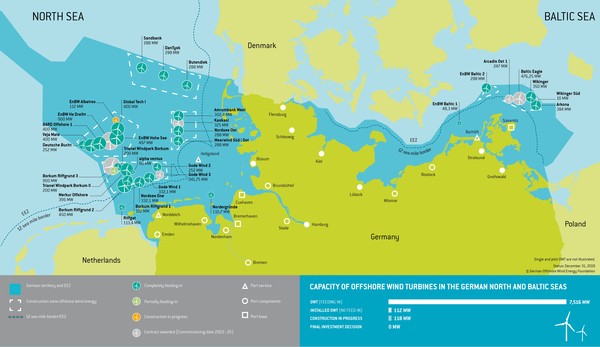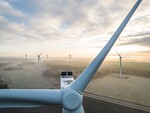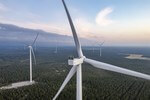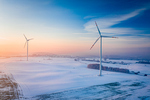News Release from windfair.net
Wind Industry Profile of
Offshore Wind = Unsuitable As A Saviour
2019 will go down in history as the year in which the issues of climate change and environmental protection finally entered the consciousness of the population. This has not left the BSH unaffected, as President Dr. Karin Kammann-Klippstein points out: "The BSH's tasks have evolved in recent years. As the central maritime authority in Germany, the BSH not only ensures that the interests of the protection and use of the oceans are balanced, but also plays an active role in shaping the energy transition in Germany within the framework of its legal responsibilities for offshore wind energy. In addition, the BSH's monitoring of increasingly stringent regulations to reduce pollutant emissions from ships also benefits people living on the coast."
The figures for offshore wind energy in Germany last year are a perfect match: five new offshore wind farms have been connected to the grid, bringing the total number to 21 (18 in the North Sea, three in the Baltic Sea). The 1,469 wind turbines have an output of 7,516 MW, as the 'Stiftung Offshore Windenergie' announced a few days ago. This means that Germany has already significantly exceeded the target of 6500 MW set for 2020.
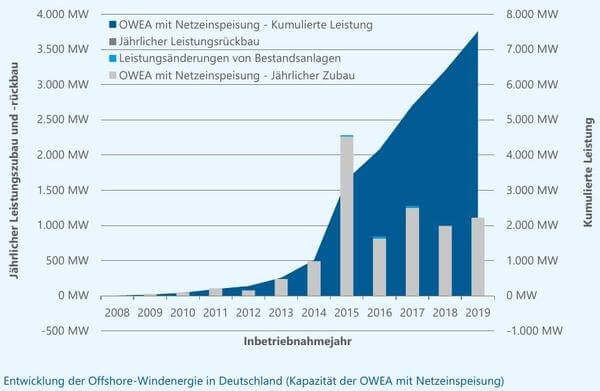
Development of German offshore wind energy (Image: Stiftung Offshore-Windenergie)
However, future problems are already apparent today. Although the German government's push to raise the expansion of offshore wind energy from 15 to 20 gigawatts planned for 2030 is encouraging, achieving this goal will be a race against time.
While the wind industry has been calling for this for a long time, the raising of the cap decided on in October 2019 has still not been laid down by law. As a result, it has not yet been possible to include potential new sites in the current land development plan, as the last plan, dated June 2019, still takes the lower volume of 15 GW as a target.
"To achieve this, the German government must quickly create the legal basis and, in a first step, allocate free capacities of up to 2 GW to cushion the consequences of the expansion gap for the domestic offshore industry. Only in this way can the domestic supply chain be maintained and earlier successes - such as the 2 GW expansion in 2015 - be achieved again," the associations therefore urge haste. "Any further loss of time will lead to additional job losses and endanger the international competitiveness of German companies.
"We expect it to take nine years - from the initial investigations of the seabed until an offshore wind turbine can finally feed electricity into the grid," says Kammann-Klippstein, explaining the lengthy work processes. Suddenly, 2030 doesn't seem so far away.
However, the first preliminary geotechnical investigations in the North Sea and Baltic Sea have already been completed for the planned expansion. The data will be available for tenders as soon as a suitability ordinance is issued. Some new insights have been gained in recent months: The shadowing effects of existing wind farms are apparently in some cases stronger than previously assumed, as reported by the operators. With turbines becoming larger, this effect will further increase. This must be taken into account when determining new areas earmarked for expansion.
In the long run, it's getting crowded off the coasts of Germany (Image: Stiftung Offshore-Windenergie)
Equally new are findings on routes taken by tankers in the North Sea, which run through some of the considered areas. This shows how important the international exchange of data is, because it was only information from the Netherlands and Belgium that contributed to this state of knowledge.
Anything beyond the German expansion in 2030 is still written in the stars at the moment anyway. Although the BSH and offshore associations agree that more areas for offshore wind power are urgently needed in order to make the energy transition succeed, at some point space will become scarce. This is a problem with currently no solution.
In the area of grid planning, on the other hand, there are already more concrete proposals: According to the associations, network expansion measures on land must be accelerated and all possibilities for better utilisation of existing networks must be exploited. Offshore wind could also play a decisive role in the area of hydrogen use. However, Germany is not yet ready to build an artificial island to convert wind energy into hydrogen directly on the ocean.
- Author:
- Katrin Radtke
- Email:
- press@windfair.net
- Keywords:
- offshore, Germany, cap, energy transition, Baltic Sea, North Sea, wind farm, turbine, wake effect, legal, ocean


